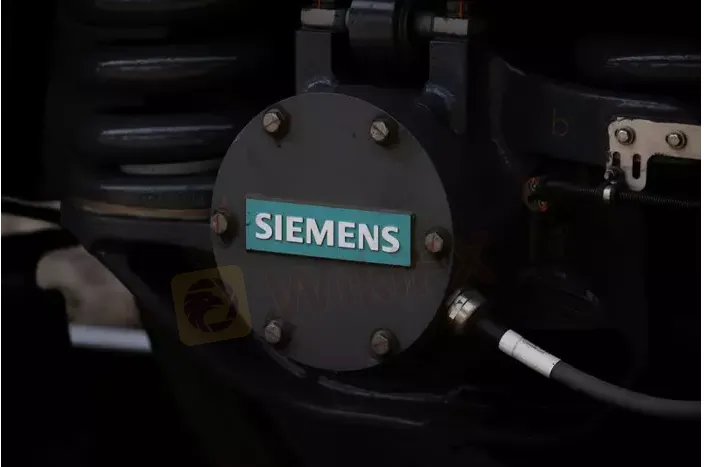简体中文
繁體中文
English
Pусский
日本語
ภาษาไทย
Tiếng Việt
Bahasa Indonesia
Español
हिन्दी
Filippiiniläinen
Français
Deutsch
Português
Türkçe
한국어
العربية
Siemens’ writedown pushes company into first loss since 2010
Abstract:Siemens reported better-than-expected revenues for its third quarter on Thursday as a writedown at Siemens Energy pushed the engineering and technology group into the red for the first time in nearly 12 years.

The maker of industrial software and trains reported revenues rising 11% to 17.87 billion euros ($18.38 billion) – beating analyst forecasts for 17.47 billion euros in a company-gathered consensus.
But Siemens posted a shareholders net loss of 1.66 billion euros after taking a 2.8 billion euro non-cash charge for writing down the value of its stake in Siemens Energy.
The loss, Siemens first quarterly loss since the fourth quarter of 2010, meant Siemens had to cut its full year earnings per share guidance to 5.33 to 5.73 euros per share, from 8.70 to 9.10 euros previously.
Siemens owns a 35% stake in the turbine and wind power company, which has had a troubled two years since spinning off in 2020, with operating problems and losses at its wind turbine division Siemens Gamesa.
Chief Executive Roland Busch said demand was still strong, despite an environment affected by sanctions on Russia, high inflation and ongoing effects from the pandemic.
“We captured significant opportunities in a market environment with ongoing high demand,” he said in a statement.
“Our strong top line momentum continued, with a comparable order growth of 20% since the beginning of fiscal 2022.”
As well as the Siemens Energy charge, the companys figures were also hit by 442 million euro in costs related to its decision to quit Russia following the conflict in Ukraine.
During the three months to the end of June, Siemens said its orders rose to 22.07 billion euros, beating forecasts for 19.82 billion euros. The 7% increase followed a 32% increase in orders in the previous quarter.
Profit at its industrial business rose 27% to 2.88 billion – short of forecasts for 3.02 billion euros.
Siemens, whose products are used to equip factories, buildings and transport networks, is seen as a signifier for the broader industrial economy.
Demand in the European capital goods sector is holding up, Barclays said last week, looking back at the results of other companies in the sector such as ABB and Schneider Electric
Siemens said it has continued to avoid major disruptions caused by supply chain problems, especially around getting enough components, raw materials and logistics.
($1 = 0.9724 euros)

Disclaimer:
The views in this article only represent the author's personal views, and do not constitute investment advice on this platform. This platform does not guarantee the accuracy, completeness and timeliness of the information in the article, and will not be liable for any loss caused by the use of or reliance on the information in the article.
Read more

Webull Canada Expands Trading Hours with Options Trading
Webull Canada now offers extended trading hours from 4 a.m. to 5:30 p.m. ET, plus options trading. Gain flexibility and manage risk in an ever-changing market.

Webull and Others Fined $275,000 for Incomplete Suspicious Activity Reports
Webull Financial, alongside Lightspeed Financial Services Group and Paulson Investment Company, LLC, has agreed to pay a collective fine of $275,000 following an investigation by the US Securities and Exchange Commission (SEC). The penalty was issued due to the firms’ failure to include essential information in suspicious activity reports (SARs) over a four-year period.

Barclays Resolves £40M Fine Over 2008 Fundraising Disclosure Failures
Barclays has reached a settlement with the UK’s Financial Conduct Authority (FCA), agreeing to pay a £40 million fine for failing to adequately disclose arrangements with Qatari investors during its critical fundraising efforts amidst the 2008 financial crisis.

WikiEXPO Global Expert Interview: Advanced Practices and Insights in Financial Regulation
In the midst of rapid advancements and evolving landscapes in financial technology, financial regulation, and ensuring financial security, WikiGlobal stands at the forefront, closely tracking these transformative trends. As we embark on our series of exclusive interviews focusing on these pivotal areas, we are delighted to have had an in-depth conversation with.
WikiFX Broker
Latest News
Saxo & Portuguese Bank Partnership
SEC Fines Broker-Dealers $275K for Incomplete SAR Filings
Elon Musk Warns of Imminent US Bankruptcy | Bitcoin Retreats from $100K
WikiEXPO Global Expert Interview: Advanced Practices and Insights in Financial Regulation
Justin Sun Invests $30M in Trump-Backed World Liberty Financial
Kraken Closes NFT Marketplace Amid New Product Focus
Robinhood Launches Ethereum Staking with 100% Rewards Match
Lured by False Promises: Malaysian Driver Lost RM218K to an Investment Scam
FTX Sets March 2025 Timeline for Creditor Payouts: What It Means for Investors
What is an Economic Calendar? How it works
Currency Calculator



